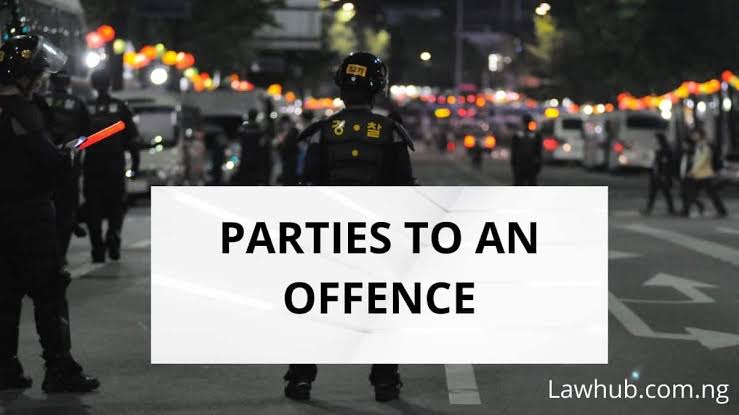N.B. This article is particular to Nigeria.
Parties to an Offence
A number of people may be involved in the commission of a crime, but the degree of their involvement may differ a great deal & the law has to decide what degree may suffice for criminal responsibility. In the criminal code, there are two distinct classes of offenders –
- Principal offenders
- Accessories after the fact.
The relevant sections of the code are chapter 2 & section 519-521. However, this may include the case of a man who is neither a principal nor accessory but who neglects to prevent a felony which he knows is being committed or is intended to be committed as provided in section 515c.c.
LIABILITY OF PRINCIPAL OFFENDERS
Section 7c.c creates 4 distinct classes of principal offenders. Each of these have little practical distinctions. For there is a rule that anyone who is found to be a principal of whatever type, is deemed to have taken part in committing the offence & could be guilty of the offence and may be charged with actually committing it.
In R. V. Akpuonu, a father buried his newly born twin in the presence of the mother. It was held that there was no evidence of that the mother took part or aided it. In other words, nothing could bring her within the provisions of S.7.
CLASSES OF PRINCIPAL OFFENDERS
- Every person who actually does the act or makes the omission which constitutes the offence. (S.7A)
Little discussion of this category is necessary. The man who sticks the knife is the one who does the murder. Where a man who does an unlawful act is acting in all innocence as the agent of another’s criminal intentions, then he himself is free of criminal responsibility.
In R. V. Idiong & umo, idiong intending to procure an abortion induced umo a native doctor to administer drugs to a woman who died as a result. The WACA took the view that imo’s intention was to relieve the woman of pain. It was held applying common law principle that he was not criminally responsible & that idiong was solely responsible.
– - Every person who does or omits to do any act for the purpose of enabling or aiding another person to commit the offence (S. 7B) & every person who aids another person in committing an offence. (s. 7C.)
These two provisions may be conveniently discussed together. The difference between them is merely that under S. 7B, the assistance bis done before the act. Whereas in S.7C the assistance is simultaneous with the offence.
–
If the aid is not given either prior or at the time of the commission of the offence, but is given after, then the accused is only an accessory after the fact. 3 factors are considered here a. The act if assistance b. Mere presence. c. Commission of a substantive offence. - Any person who counsels or procures another to commit the offence (S.7D)
The last category of principal, those who counsels or procure the commission of a n offence is similar to those who do an act for the purpose of enabling or aiding, although under s.7d, words alone suffice for liability. But the words of counseling must be a sort of positive encouragement as evident in R. V. Idika.
In Ajao v. Alkali amode, an alkali who ordered a policeman to slap an accused for contempt of court was held guilty of assault by virtue if S. 7D.
MENTAL ELEMENTS OF PRINCIPAL OFFENDER
It has been held by the Queensland court of criminal appeal in R. V. Solomon, that S.7 should be read in conjunction with S. 24 & that S. 7 is not intended to create responsibility for unwilled act.
It is submitted that these two authorities provide a correct view of the section since a man cannot be liable for acts which occurs independently of his will as this comes under S. 8 & 9.
LIABILITY AS AN ACCESSORY AFER THE FACT
A person who receives or assists another who is to his knowledge guilty of an offence in order to enable him escape punishment is said to become an accessory after the fact.
Whereas the principal the principal offender is liable to full punishment, the general punishment for an accessory after the fact, is considerably less than 2years maximum imprisonment of it’s a felony & 1 & half years for a misdemeanor.
Actus reus
The actus reus for the offence is receipt or assistance after the commission of a crime. In English law, if a man assists an accessory after the fact, then he himself may become an accessory after the fact. This is provided for in section 10.
Mens rea
The mens rea require is the knowledge of the guilt of the person assisted plus the intention to facilitate escape from punishment which must be proved on all evidence.
Limits to the liability of an accessory after the fact
The law on this subject is wide especially of Sections 10 covers cases of assistance by omission. Section 10 applies to all offences whether felonies or misdemeanor. The only limit provided for in section 10 is that a wife is not an accessory after the fact if she assists her husband to escape punishment. This rule is clearly based on the various emotions which may arise between husband & wife.
Contributed by: Abdulganiyu Ismail (AKA) Mastermind
Prepared and Written by: Ucheakonam Chijioke Joshua (CJ)


Leave a Reply